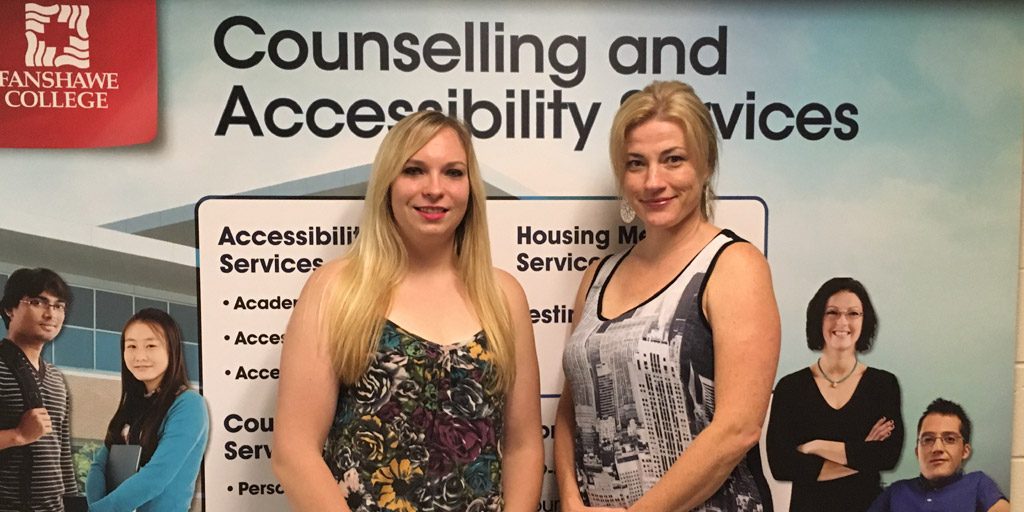Fanshawe group focuses on showcasing mental health resources
 CREDIT: MELISSA NOVACASKA
CREDIT: MELISSA NOVACASKAShelley Sinclair (right), accessibility counsellor and co-ordinator of Accessibility Services and Fanshawe student Terese Bonenfant (left) are part of the accommodation working group to help spread awareness of the new directives under the Ontario Human Rights Commission for students dealing with mental health.
The Ontario Human Rights Commission made a new directive earlier in the year that would change the way students with mental health conditions are to be accommodated on campus, according to Heather Cummings, executive director of Student Success.
The change would allow those students who need accommodations to not have to disclose their specific mental health disability when looking for assistance on campus; however, they will still need to provide medical documentation, Cummings said. The students will also be allowed to request interim accommodations pending a receipt of medical documentation.
Cummings said that this all means Fanshawe must now consider all request for retroactive accommodation and develop processes so students will no longer have to contact their faculty directly with their accommodation requests.
Fanshawe has a human rights policy to accommodate any student with a disability, whether it be visible or not, said Shelley Sinclair, accessibility counsellor and co-ordinator of Accessibility Services.
“One disability or challenge that a lot of students have been facing over recent years, and we’ve seen our numbers increase is in terms of mental health challenges,” Sinclair said.
Sinclair said that the directive from the government makes access to accommodations easier for those students who are facing a mental health disability.
There is a process to register with accessibility services, Sinclair said, but some students had previously gotten caught up in that, and with the nature of some mental health issues, for some students it may be their first onset and so it takes time to get a diagnosis and get the right support in place.
“We don’t want to have them lose their education while we’re waiting for those pieces,” Sinclair said.
“We just want to be able to respond quickly to those needs so that academics are not affected and it has the least possible negative impact on the student’s experience here,” Sinclair said.
The directive also gives the students the choice of whether or not they want to tell their professors about their diagnosis, but the professors will get an accommodation form to explain the needs of the student, that was discussed between the student and counsellor.
Sinclair, along with a number of other school and student representatives formed an accommodations working group. This group focuses on making sure the directives from the government are met, but doing so at ground level for the college. The group focuses on what policies and practices need to change and new things that need to be thought out so the government directives are met.
“It’s evolved from not just the directive, [but] to educating and training faculty and students about mental health,” said Terese Bonenfant, a selected student representative from the accomodations working group.
She has also been using the services offered at the Accessibility Services office, which makes her an even better asset for the working group.
The committee meets bi-weekly, and has been working to make sure the directives were made for the beginning of September, Sinclair said.
“Education is a huge piece of what we do in that committee,” she said.
As much as the stigma around mental health is trying to be eliminated, Bonenfant said there are still so many students who do not know they can get the kind of help that the accessibility and counselling offers, which Bonenfant said was something she was lost about when she was trying to figure out where to get help for her mental health disability.
Bonenfant said the group also tries to educate people on where they can get help on campus. According to Sinclair, the Accessibility Services office is always quite busy, but there has been a noted trend of the number of students who register with accessibility services who have mental health issues or diagnosis increasing every year.
“No one is immune, and we really promote from our working group understanding, compassion and empathy because we all want students to be successful,” Sinclair said.














